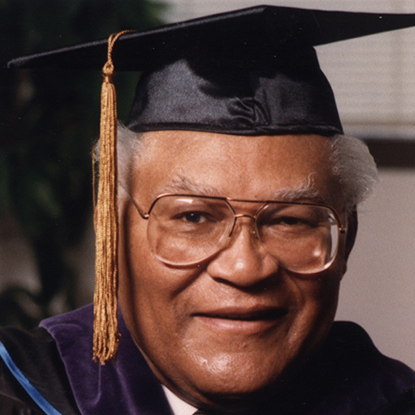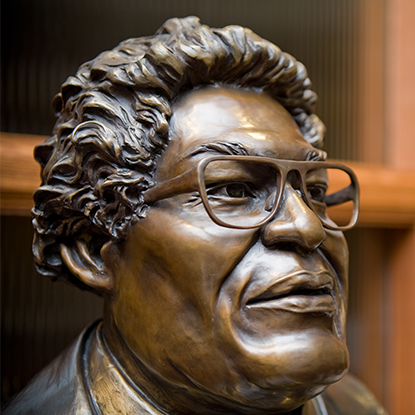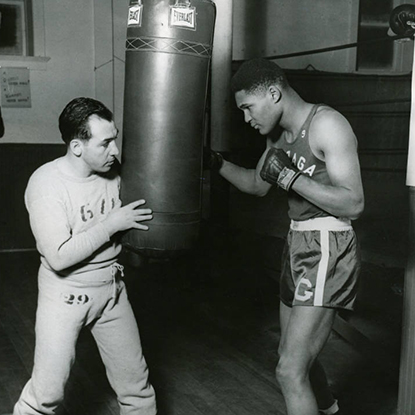Carl Maxey ('51 J.D.)
About the Scholarship
Carl Maxey was a giant in civil rights, law, sports and politics. Orphaned at the age of two and growing up in a predominantly white community, Carl’s first-hand experiences of racism and inequality were the seeds that fueled his passion for social justice. He was the first African American man in Eastern Washington to pass the bar and become an attorney. During his career of over 40 years, Carl earned a well-deserved reputation as an exceptional trial lawyer and a nationally-recognized civil rights leader. You can read more about Carl Maxey below.
The Carl Maxey Social Justice Scholarship Program provides a unique opportunity for exceptional students to further their commitment to social justice and to become leaders in the profession. Each year, a scholarship committee selects several students to be Social Justice scholars. These scholars are awarded full tuition scholarships to allow them to pursue careers in social justice and to serve the public good.
Eligibility & Application
All applicants for the Carl Maxey Social Justice Scholarship Program must apply through the application for admission to Gonzaga Law School. Applicants must include a supplemental essay of 500 words (or less) addressing how they would contribute to the mission of the program. The essay should address your demonstrated commitment to social justice, your potential and promise to be a leader, and your contribution to the diversity of the profession.
Applications will be reviewed beginning February 1. If your application for admission is not complete at this date, you may not be considered for the award. Finalists for the Carl Maxey Social Justice Scholarship Program may be asked to participate in an interview before a decision on your application is made. Executive Two-Year J.D. applicants are not eligible for this award.
Carl Maxey ('51 J.D.)
1924 - 1997
Carl Maxey was born in Tacoma, Washington in 1924 and was orphaned at the age of two. Born into poverty, he might never have progressed past his initial hardships. Instead, through his hard work and the mentorship by a Jesuit, Father Cornelius Byrne, at Sacred Heart Mission in DeSmet, Idaho, he became a giant in civil rights, law, sports, and politics.
Maxey attended Gonzaga Prep, where he excelled both academically and athletically. After graduation, from 1943-46, he served in the U.S. Army in World War II. He attended the University of Oregon from 1946-48 on a track scholarship. In 1948, he came to Gonzaga to pursue his law degree.
Maxey had a tall stature and intimidating presence mixed with unique talents as an athlete. In 1950, he won the national NCAA light heavyweight boxing championship title, ensuring Gonzaga's first NCAA team, and he remained undefeated in his collegiate boxing career.
Carl Maxey with his coach, Joey August, as he trains with a punching bag in 1949.
After graduating from Gonzaga University School of Law in 1951, Carl Maxey began a 40-year professional career that would earn him a deserved reputation as an exceptional trial lawyer, a skilled counselor, and a nationally-recognized civil rights leader. He opened the Fredrickson, Maxey, Bell & Allison Law Firm in 1960, and while he built a highly successful private law practice, he continued to devote around 20 percent of his time to pro bono work. He later formed the Maxey Law Offices with his sons, William (’75 J.D.) and Bevan (’83 J.D.).
During the Freedom Summer of 1964, he volunteered in Mississippi to help blacks register to vote, freed black activists from jail and marched alongside Dr. Martin Luther King Jr. In addition, Carl helped members of the NAACP, specifically handling hundreds of pro-bono cases. He was appointed by five different U.S. presidents to serve as the chairman of the Washington State Advisory Commission to the U.S. Commission on Civil Rights. He had a singular impact on the advancement of equal rights in Spokane and throughout Washington State.
Maxey's unique contribution was recognized by his peers. In 1982 he received the William O. Douglas Bill of Rights Award, the highest award conferred by the Washington State Chapter of the American Civil Liberties Union. In 1988, the Legal Foundation of Washington presented him with the Charles A. Goldmark Award for his work promoting equal justice for all. In 1993, Gonzaga University School of Law conferred on Carl Maxey its highest award-the Gonzaga Law Medal.
Maxey passed away in 1997. Today, his legacy lives on through his many contributions to Spokane and the state of Washington. Maxey Law Offices continue to serve clients with Carl’s sons William ('75 J.D.) and Bevan ('83 J.D.) along with grandsons Morgan (’17 J.D.) and Mason (’20 J.D.) joining the practice.



